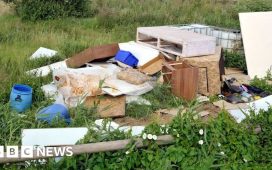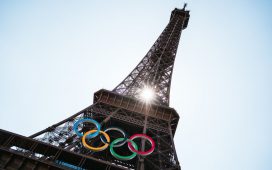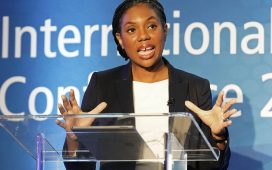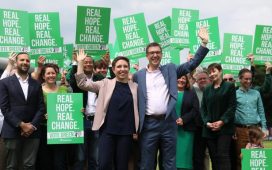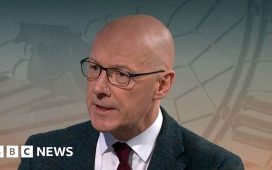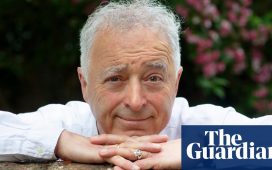Sunak says he believes he will win the general election despite poll projections
Rishi Sunak said he believes he will win the general election.
Asked whether he thought he would still be prime minister on Friday, the prime minister said: “Yes. I’m fighting very hard and I think people are waking up to the real danger of what a Labour government means.”
The Labour lead in the opinion polls has been 20 percentage points throughout the campaign.
The final Opinium poll for the Observer on Saturday showed Labour retained this lead over the Conservatives – the same as a week ago and enough to deliver a large House of Commons majority if replicated on Thursday.
Labour is on 40% (unchanged compared with a week ago), while the Conservatives are on 20% (also unchanged). Reform UK is up 1 point on 17%, the Liberal Democrats up 1 point on 13% and the Greens down 3 points on 6%.
🚨 New polling with @ObserverUK
Labour continue to lead by 20
· Labour 40% (n/c)
· Conservatives 20% (n/c)
· Reform 17% (+1)
· Lib Dems 13% (n/c)
· Greens 6% (-3)
· SNP 3% (n/c)
Fieldwork: 26 – 28 June. Changes from 19 – 21 June. pic.twitter.com/s3ozTKQDEj— Opinium (@OpiniumResearch) June 29, 2024
Key events
Keir Starmer pledges to “relight the fire” of optimism and hope among the British people – and rekindle their faith in politicians as public servants – if they come out in sufficient numbers and vote for a Labour government in Thursday’s general election.
Writing exclusively for the Observer with just days to go until polling day, the Labour leader says that after 14 years of the Tories “serving themselves”, restoring the “bond of respect between people and politics” will be the precondition for a Labour government’s success.
Striking a serious note and avoiding any hint of triumphalism, he writes:
I am sure some people would prefer a less sober message. But the Tories have kicked the hope out of people so thoroughly, to expect a chorus of optimism would be like scattering seeds on stony ground.
I believe in hope, and believe we can inspire it again. Showing that it is a privilege to serve is a precondition for it.
You can read the full story by my colleagues, Toby Helm, Michael Savage and James Tapper, here:
Starmer insists that if people choose him as their prime minister, then Labour will embark on a “national mission” to create wealth in every community and repair public services “with an immediate cash injection” alongside “urgent reforms”.
Sinn Féin wants to maximise the number of “progressive” MPs returned from Northern Ireland in this year’s general election, vice-president Michelle O’Neill has said.
The PA news agency reports:
The party is running 14 candidates, standing aside in East Belfast, North Down and Strangford where Alliance is challenging unionists, as well as South Belfast where the SDLP is hoping to return to the green benches.
Ms O’Neill said it had not been an easy decision to stand aside in the four constituencies but said the party wants to see a “rejection” of those who had “propped up” the last Conservative government.
It comes after the DUP maintained a close relationship with the Conservatives, including taking part in a confidence and supply deal in 2017 following the return of a hung parliament.
“We want this election to return the maximum number of progressive candidates,” Ms O’Neill told the PA news agency.
“The maximum number of MPs that want to make politics work here at home, the maximum number of MPs that reject Tory austerity and the cuts that have decimated our public services for the past 14 years, and also to reject those people that actually propped up the Tories throughout that tenure, so that we set aside in those constituencies to actually make space for that progressive candidate to come through.”
Sinn Féin won seven seats at the last general election in 2019. This year, Ms O’Neill said the party is hoping to maintain the seven and potentially build its vote.
The party is targeting gains including attempting to win Foyle over SDLP leader Colum Eastwood.
This general election comes after a disappointing showing for Sinn Féin in the Republic of Ireland where it was widely seen as the government in waiting, but suffered a major setback when its support in the European and local government elections dropped well below what was projected.
Scotland’s first minister, John Swinney, has indicated that the SNP would continue to press for a second referendum on Scottish independence even in the event of significant electoral losses at the election.
He told Sky News:
The issues that people are concerned about in Scotland today – the cost of living crisis, the cuts in public services and our public spending, the implications of Brexit – these are all decisions that were arrived at [in] Westminster.
If Scotland was an independent country, we could take a different course.
The SNP leader added that the economic impact of Brexit amounted to “a very significant change in circumstances that I believe alone merits the right of the people of Scotland to decide their own future”.
The SNP’s long-held policy – agreed at its conference last year – is that a majority of seats would be a mandate to begin negotiations with the UK government for another independence referendum.
It is possible for the SNP to be the largest party in Scotland but not have a majority of the 57 seats. After a huge swing to Labour in the past 18 months, the SNP is teetering on the brink. Small local or national tremors in the final days of the campaign could determine the fate of dozens of SNP MPs.
Farage says the Reform UK activist filmed making racist comments about Rishi Sunak is an actor
Nigel Farage, the Reform party leader, is asked about racist comments made by Reform UK canvasser Andrew Parker, which Farage claims was a set up. He suggests Parker, who made racist comments about Rishi Sunak, was an actor.
Farage told Trevor Phillips on Sky News:
He is an actor, a rather well spoken actor but he has an alter ego. He does what he calls ‘rough speaking’. I was there working in the office in Essex, when he turned up, and he was from the moment he walked through the room like a version of Alf Garnett (a character in the British sitcom ‘Till Death Us Do Part).
Now I didn’t know this was an act. It was an act from the start to the end. He spent time with the two Channel 4 undercover reporters in the office …
He tried to get our canvassers to say nasty, racist things, which, of course, they did not. And then he comes out with this, and literally, Alf Garnett stream, including all mosques should be turned into Wetherspoon’s. This was an act from start to finish. It was a deliberate attempt to derail our campaign.
Trevor Phillips asks Farage, who said he had fought hard to drive the BNP out as an electoral force, how many people in Reform he has had to “disown so far”. Farage replies says “perhaps a dozen”.
“I have inherited a start up. I have not even been doing this a month and I have got some people there that i rather were not there and they wont be after next Thursday at all,” Farage said.
Sunak says he believes he will win the general election despite poll projections
Rishi Sunak said he believes he will win the general election.
Asked whether he thought he would still be prime minister on Friday, the prime minister said: “Yes. I’m fighting very hard and I think people are waking up to the real danger of what a Labour government means.”
The Labour lead in the opinion polls has been 20 percentage points throughout the campaign.
The final Opinium poll for the Observer on Saturday showed Labour retained this lead over the Conservatives – the same as a week ago and enough to deliver a large House of Commons majority if replicated on Thursday.
Labour is on 40% (unchanged compared with a week ago), while the Conservatives are on 20% (also unchanged). Reform UK is up 1 point on 17%, the Liberal Democrats up 1 point on 13% and the Greens down 3 points on 6%.
🚨 New polling with @ObserverUK
Labour continue to lead by 20
· Labour 40% (n/c)
· Conservatives 20% (n/c)
· Reform 17% (+1)
· Lib Dems 13% (n/c)
· Greens 6% (-3)
· SNP 3% (n/c)
Fieldwork: 26 – 28 June. Changes from 19 – 21 June. pic.twitter.com/s3ozTKQDEj— Opinium (@OpiniumResearch) June 29, 2024
Rishi Sunak said the slur used about him by a Reform UK canvasser was “deeply inappropriate and racist”.
The prime minister told the BBC’s Sunday With Laura Kuenssberg show that anyone becoming a politician expects a degree of criticism because it “comes with the territory”.
But he went on: “But in this instance, you know, what was said was deeply inappropriate and racist.”
Sunak said he hated having to repeat the phrase used about him but thought it was important to call it out. He said that Britain is “the most successful multi-faith, multi-ethnic democracy anywhere in the world”, adding: “That’s why views like this are so damaging and so wrong.
“They belong to a minority of people and they deserve to be called out for what they are, and that’s what I did.”
A Reform UK activist in Clacton, the constituency where Nigel Farage is standing, was secretly filmed making extremely racist comments about Sunak, as well as using Islamophobic and other offensive language.
Farage said he was “dismayed” by the views expressed by Andrew Parker, a Reform canvasser, who was filmed as part of an undercover investigation by Channel 4 News.
During one journey, Parker described Sunak as “fucking [P-word]”. He said: “I’ve always been a Tory voter, but what annoys me is that fucking [P-word] we’ve got in. What good is he? You tell me, you know. He’s just wet. Fucking useless.”
Sunak ‘wholeheartedly rejects declinist narrative’ of the UK losing its standing across the world
Rishi Sunak said he “wholeheartedly rejects” the “declinist narrative” of the UK losing its longterm standing in the world following Brexit and the government’s recent rhetoric on climate change.
Q: “There is plenty of evidence, even from your own minister in the last few days, that the economic reality of Brexit is that the UK’s standing long term is more challenging than had we stayed in the EU. And you promised control of immigration, which many voters thought would mean immigration would come down when we left the EU. And of course, until very recently, it was going up and up and up. And another promise that seems to have gone by the wayside, is the kind of bold commitment that your boss, Boris Johnson, used to make when it comes to climate change. Now, at your party’s conference this year, you shifted tack and you shifted the rhetoric, but some people believe, including the independent Climate Change Committee, it means that the UK has lost its status as a leader. Is that a mistake?
A: No, and actually, you started that question with something that I fundamentally disagree with. Because of Brexit we’ve lost our standing in the world? (Laura Kuensbugg disagrees this is what she says) That is completely and utterly wrong. We’ve just had a visit from the Japanese last year, we signed the Hiroshima accords with Japan, unequivocally Japan’s stating that we are their closest ally in Europe. We’re building a new generation of nuclear submarines with Australia and America. Never happened before that we have shared technology before on that scale. We’ve negotiated the Windsor framework with the EU, restored government in Northern Ireland, joined the CPTPP trade deal and we are leading the world and leading in Nato when it comes to supporting Ukraine, investing more in defence, standing tall with our allies. People are queueing up to work with us because they respect what we do. So I just completely reject that. It’s entirely wrong. This sort of declinist narrative that people have of the UK I whole heartedly reject.
Sunak says Brexit was the ‘right thing’ for the UK and has created lots of new opportunities
Rishi Sunak says Brexit was the “right thing” for the UK.
The prime minister said:
We had a referendum. The British people made a choice. I was proud to support Brexit. It was the right thing for our country. And actually, what you’re now seeing this year is our economy growing faster than every one of our major competitors.
And actually we have now overtaken the Netherlands, France, Japan, to become the fourth largest export economy in the world. Thanks to the freedoms we have as a result of Brexit, we’re able to regulate and cut red tape in a way that supports growth and investment.
Laura Kuenssbergg highlighted comments from the Office for Budget Responsibility that trade would be much lower in the long term because of Brexit. She asks if he accepts that leaving the EU has made things more difficult for a lot of businesses.
Sunak said leaving the single market and the customs union changes the nature of trading relationships, but said that many businesses are taking advantage of the new “opportunities” he claims Brexit has presented, with the UK having “the deepest” bilateral free trade agreement with the EU. He said the UK can sign trade deals with faster growing parts of the economies around the world, like in Asia.
Kuenssbergg points out that the vast majority of the trade deals Sunak referenced are “rollovers” from deals the UK already had with the EU, and that the US is currently not interested in doing a trade deal with the UK, something that was promised during the referendum campaign.
Rishi Sunak does not accept that the country has become poorer, sicker and has worse public services over the past 14 years. The prime minister does not accept this, pointing to the Conservative’s record on education (claiming “our children are best readers in the world” and that 9 out of 10 schools are rated outstanding).
‘This country is a better place to live now than it was in 2010,’ Sunak says
Rishi Sunak is now being interviewed by Laura Kuenssbergg. He said this country is a better place to live now than it was in 2010, when the Conservatives came into power (in a Lib Dem coalition), though he acknowledged the last couple of years have been difficult due to the pandemic and rising bills.
Pat McFadden, Labour’s campaign chief, is on the Laura Kuenssbergg Sunday programme on the BBC. He said “we are not going back to freedom of movement” when asked if any sort of freedom of movement would be negotiated with the EU under a Labour government (particularly in terms of young people wanting to travel and work abroad).
He also said that the Democrats had a “tough” night this week, referring to Joe Biden’s substandard debate performance against Donald Trump, but said the UK-US relationship would remain strong irrespective of who wins the US elections in November.
When asked about the Russian interference claims on Sunday, Oliver Dowden said there is a threat to the general election from hostile actors such as Russia seeking to influence the democratic process.
The deputy prime minister told Sky News:
There is a threat in all elections, and indeed we see it in this election from hostile state actors seeking to influence the outcome of the election campaign. Russia is a prime example of this, and this is a classic example from the Russian playbook.
What I would say is this is relatively typical, low-level stuff, but we stood up the election cell in the Cabinet Office, we did that at the very beginning of the campaign, and it was designed to look into exactly this sort of thing and I think that …
It should just be a salutary reminder for all of us, when you engage on social media, are these people that you think are posting stuff, are they real or are they bots generated by hostile state actors? It’s something we all need to be aware of.
Oliver Dowden: Claims of Russian interference in the UK general election ‘gravely concerning’
The UK’s deputy prime minister, Oliver Dowden, has warned that alleged Russian interference in the UK general election campaign is “gravely concerning”.
He responded to Australian Broadcasting Corporation’s (ABC) claims that it had been monitoring five coordinated Facebook pages promoting Kremlin talking points, with some expressing support for the Reform UK party.
In a statement carried by the Sunday Times, Dowden said:
These revelations reveal the real risk our democracy faces in this uncertain world.
Malign foreign actors, promoting British political parties, policies and views that fit their agenda is just another example of the challenges in the increasingly volatile cyberspace of the 21st century and is gravely concerning to see during an election campaign.
According to ABC, the pages appeared to have little in common but were linked through an examination of the location data attached to the pages’ administrators, the tracking of paid ads, and an analysis of the pages’ similar or shared content.
The network of pages has a combined 190,000 followers, each featuring criticism of several UK political parties, including the Conservatives and Labour, according to the ABC.
Conservative party chairman Richard Holden has written to Simon Case, the cabinet secretary, and Sir Tim Barrow, the national security adviser, asking for the claims to be investigated.
Buyer’s remorse will set in if public votes in Labour government, deputy prime minister says
The UK’s deputy prime minister, Oliver Dowden, has been asked by Trevor Phillips on Sky News if it is too late to unite the “Conservative family”.
He admits that he has spoken to many voters who are undecided about what party they are going to vote for on 4 July, adding that he understands people’s concerns about the Tories, who have been in power for the last 14 years.
Dowden said:
The only way, if you share out conservative values, of cutting taxes, of controlling migration, it’s only by voting Conservative that you can stop Labour getting in.
And what I would say is just think, think in six months’ times how you’re going to feel. I have a strong feeling the shine is going to come off Labour pretty quickly, buyer’s remorse will set in.
And the bigger the Labour majority, the bigger the buyer’s remorse. Everyone still has it in their hands to stop that by making sure they vote Conservative.
Dowden says his aim is still for the Conservatives to win an “overall majority”, something that is extremely unlikely.
He said the public should not focus on their anger “just now” and instead think of what the country would be like in six months to a year’s time if led by Keir Starmer, the Labour party leader.
Opening summary
Good morning, and welcome to our continued coverage of the 2024 general election campaign.
The final Sunday of the campaign will see Rishi Sunak face the BBC’s Laura Kuenssberg for what could be the last time as prime minister, if the polls are to be proved correct.
The prime minister, who is himself in danger of losing his seat of Richmond and Northallerton, is today warning that Labour would cause “irreversible damage within just 100 days of coming to power”.
Sunak said:
It’s clear that Labour would do irreversible damage within just 100 days of coming to power.
Whether it’s announcing a suite of tax rises or throwing thousands of families’ plans for the autumn term into chaos, with children wondering if they will have a desk at school to go back to.
Labour would throw open our borders with their illegal migrant amnesty and free movement for under-30s in their deal with the EU, making us the soft touch migrant capital of the world.
They cannot be trusted. We must not surrender our taxes, our borders and our security to them. Only the Conservatives will deliver tax cuts, a growing economy and a brighter, more secure future for everyone.
The prime minister will follow up his appearance on Sunday with Laura Kuenssberg by campaigning in London. We can expect the last few days of the campaign will see Conservatives repeating the idea of an unchecked Labour administration in power.
On Saturday, the final Opinium poll for the Observer showed Labour had retained a 20-point lead over the Conservatives – the same as a week ago and enough to deliver a large House of Commons majority if replicated on Thursday.
Labour is on 40% (unchanged compared with a week ago), while the Conservatives are on 20% (also unchanged). Reform UK is up 1 point on 17%, the Liberal Democrats up 1 point on 13% and the Greens down 3 points on 6% (you can read more in this story here).
Here is some of what to expect on the campaign trail today:
-
The UK’s deputy prime minister, Oliver Dowden, will be on Sky News, where he is likely to face questions about reports he could be put in place as a caretaker Tory leader if Sunak quits after a defeat in Thursday’s general election.
-
The Reform party leader, Nigel Farage, will be on Sky’s Sunday Morning With Trevor Phillips. He will later address a gathering of 5,000 Reform UK supporters at Birmingham’s NEC, which he said would be “our biggest rally ever”.
-
Scotland’s first minister, John Swinney, and Liberal Democrat deputy leader Daisy Cooper will also be on the airwaves.
-
Swinney, the SNP leader, is expected to follow up his morning TV appearance with a campaign event, while Scottish Labour leader Anas Sarwar and Lib Dem leader Ed Davey will also be campaigning.
-
Labour’s national campaign coordinator, Pat McFadden, will be setting out his party’s message that it can “stop the chaos” – but only if people turn out to vote.
It is Yohannes Lowe here for the next couple of hours. If you want to get my attention then please do email me on yohannes.lowe@theguardian.com. The comments will be turned on today around 10am.


